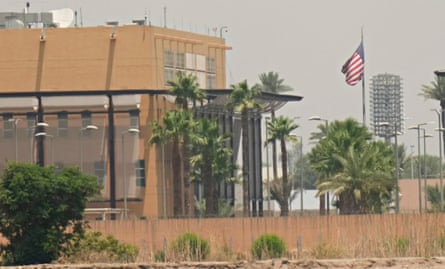Donald Trump has warned that a “massive conflict” could break out in the Middle East soon if talks over an Iranian nuclear deal break down, amid concerns over a possible Israeli strike against Tehran.
Trump said on Thursday he was worried that an Israeli strike could “blow” the negotiations, and he confirmed he had ordered some US personnel to evacuate from the Middle East in case of an Iranian counterattack that could include “missiles flying in their buildings”.
His warning came after the International Atomic Energy Agency issued its strongest condemnation of Iran in 20 years as it said the country had continued to enrich uranium to near weapons-grade levels and had failed to comply with its nuclear nonproliferation obligations.
Iran responded defiantly, calling the censure a “political resolution” and announcing it had built and would activate a third site to enrich uranium that could produce fissile material used to make a nuclear weapon.
US and European officials have been told that Israel is fully ready to launch a pre-emptive strike targeting Iran’s nuclear programme, even if Washington does not provide direct support, US media have reported. There is no clear timeline for when Israel would launch a strike and Trump said Israeli officials “have not told me anything”.
But Trump said an Israeli attack against Iran’s nuclear programme “could very well happen”.
“There’s a chance of massive conflict,” he said. “We have a lot of American people in this area. And I said we have to tell them to get out soon. And I don’t want to be the one that didn’t give any warning and missiles are flying into their buildings.”
On Thursday the commander of Iran’s Revolutionary Guards, Hossein Salami, said the retaliation to any Israeli aggression would be “more forceful and destructive” than in past offensives, after Tehran said it had been alerted to a potential attack.
The US decisions to pull personnel from embassies and bases in the Middle East sparked concerns over an impending military strike but also speculation that the Trump administration may be increasing pressure on Iran to concede to a deal in order to avert a regional war.
Trump’s Middle East envoy Steve Witkoff will travel to Oman for a sixth round of talks with Iranian officials on Sunday, a source familiar with his travel plans said on Thursday.
Trump said: “I want to have an agreement with Iran. We’re fairly close to a pretty good agreement … as long as I think there is agreement, I don’t want [Israel] going in, because I think it could blow it.”
The motion by the UN nuclear watchdog on Thursday focused on Iran’s refusal since 2019 to explain activity at three secret nuclear sites, but also on Iran’s buildup of its stockpile of uranium enriched to 60%, close to weapons grade. The European powers said the IAEA had not been able to guarantee that Iran’s nuclear programme was exclusively peaceful.
The watchdog’s vote is a necessary precursor to European powers using their right to reimpose UN-wide sanctions on Iran in the autumn. The motion was passed with 19 votes in favour, three against and 11 abstentions. In a joint statement, the three European powers and the US said “It is not the board that is forcing this step on Iran, but Iran who is forcing this step on the board”.
Iran’s nuclear chief, Mohammad Eslami, disclosed that a new, previously secret third enrichment site had been built and was ready to operate when equipped with machinery. He said advanced sixth-generation enrichment machines would replace first-generation machines at its Fordow fuel enrichment site.
The sense of imminent drama intensified late on Wednesday when the US state department said it had ordered the departure of all non-essential personnel and their dependents from its embassy in Baghdad.
Simultaneously, a US official said the defence secretary, Pete Hegseth, had authorised the voluntary departure of military dependents from countries across the region, including Bahrain and Kuwait. American soldiers in the region were not affected by this order.

The key sticking point in the nuclear talks is Iran’s right to enrich uranium domestically.
Iran’s president, Masoud Pezeshkian, said Iran would not back down on its right to enrich and said his country would go its own way. In return for the lifting of sanctions, it has offered to enrich uranium inside its country subject to greater IAEA inspection and previously agreed limits on enrichment of 3.67%.
In what could be a preparation for an Israeli attack, but may yet be Trump loading the psychological bargaining chips before Sunday’s talks, Israel’s strategic affairs minister, Ron Dermer, and the Mossad intelligence agency head, David Barnea, will meet Witkoff in advance of the Oman-brokered nuclear talks.
Iran regards the Trump demand not to enrich as unreasonable since other nuclear non-proliferation treaty states are allowed to do so, and Iran’s right had been accepted by the Obama and Biden administrations.
Iran says its nuclear ambitions are confined to a civil nuclear programme, but Israel claims past Iranian deceit means military action is the only certain way to remove the threat of Iran acquiring a nuclear bomb.
Israel believes that after its two military exchanges with Tehran last year, Iranian air defences are uniquely vulnerable, and Iran’s preparations for a bomb are so advanced that delay would be a historic error.
David Albright, the president of the Institute for Science and International Security, said: “If you are at 60% enriched, you are 99% of the way to weapon-grade uranium, which is the ideal material for nuclear weapons. So this programme does not look like a civil programme. It looks like they are going up the ladder to get toward weapon-grade uranium while not actually making the weapon-grade uranium.”
He said Iran could get to weapons-grade uranium within a week, while a crude nuclear explosive device could be attached within months.
Albright said Israel had very good intelligence on the layout of Iran’s nuclear sites, especially the Fordow fuel enrichment plant. He said: “They know exactly how the tunnels go, where they start, how they zig and zag, where the ventilation system is, the power supplies. And without it, you don’t have to bring down the roof of the enrichment hall to put that facility out of operation for a long time and make it very hard to get into.”
It is contested whether Israel, lacking the US’s 30,000lb bunker-busting Moab ( “mother of all bombs”), has the capability to destroy the Fordow facility due to its depth underground.

.png) 3 months ago
54
3 months ago
54

















































